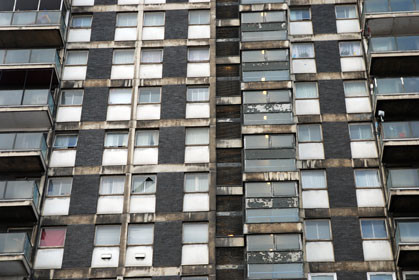Jens Haaning
The Street
11 Sep - 02 Nov 2008
The work of Danish artist Jens Haaning focuses on how society is composed and how power is expressed and communicated within it. He is particularly interested in the consequences of mixing cultures and the movement of individuals, objects or concepts across geographical and cultural borders.
Baghdad Time is a new work created by Haaning for The Street.
For this project with the Whitechapel Gallery, Jens Haaning exhibits a clock on a wall on Brick Lane set to Baghdad time.
Beyond the confused reactions to a clock going ‘wrong’, the work highlights economic and diplomatic relations between England and Iraq, with British participation in the war in Iraq as the main connection. To Haaning, the clock is a reminder of a situation occurring in another place; a situation that we have the power to influence despite its geographical distance.
In previous works, Haaning has addressed subjects such as immigration and economic and cultural power relations. One example is ‘Redistribution (London-Karachi)’, 2003, when all the chairs from the ICA, London were shipped to Karachi, Pakistan. They were then left on the street for passers-by to use or take as they wished. In another work from 2002, as part of the major international exhibition Documenta XI, he swapped all the lightbulbs in a street in Kassel, North Germany, with those in a street in Vietnam.
Baghdad Time is a new work created by Haaning for The Street.
For this project with the Whitechapel Gallery, Jens Haaning exhibits a clock on a wall on Brick Lane set to Baghdad time.
Beyond the confused reactions to a clock going ‘wrong’, the work highlights economic and diplomatic relations between England and Iraq, with British participation in the war in Iraq as the main connection. To Haaning, the clock is a reminder of a situation occurring in another place; a situation that we have the power to influence despite its geographical distance.
In previous works, Haaning has addressed subjects such as immigration and economic and cultural power relations. One example is ‘Redistribution (London-Karachi)’, 2003, when all the chairs from the ICA, London were shipped to Karachi, Pakistan. They were then left on the street for passers-by to use or take as they wished. In another work from 2002, as part of the major international exhibition Documenta XI, he swapped all the lightbulbs in a street in Kassel, North Germany, with those in a street in Vietnam.

